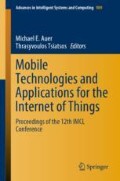Abstract
This research paper presents the results of a study that applied with a sample probability and random sample to students of technologies of the information of the Academic Department of Computational Systems (DASC, by its initials in Spanish) of the Autonomous University of Baja California Sur (UABCS, by its initials in Spanish) in order to analyze what is the level of skills for the use of m-learning environments, i.e., the set of knowledge that has managed to acquire the student without any difficulty for the use of m-learning environments. The study considered a methodological approach of descriptive quantitative, where were collected data on different aspects of the use of mobile devices. The development of research was a group of students at university level of Educational Programs (PE) of the DASC: Engineering in Development of Software (IDS, by its initials in Spanish), Engineering in Computational Technology (ITC, by its initials in Spanish), and Bachelor of computing (LC, by its initials in Spanish). Of the total number of students enrolled in the DASC (496) randomly selected a representative sample of 115 students. Factors related to the evaluation of mobile learning in higher education were classified into three main categories: basic operations, management of information and communication and collaboration.
Access this chapter
Tax calculation will be finalised at checkout
Purchases are for personal use only
References
UNESCO. (2012). Turning on mobile learning in Latin America (pp. 1–69). UNESCO.
Naismith, L., Lonsdale, P., Vavoula, G., & Sharples, M. (2004). Literature review in mobile technologies and learning. http://www.futurelab.org.uk/sites.
Zamarripa, R. (2015). M-learning: El aprendizaje a través de la tecnología móvil, desde la perspectiva de los alumnos de educación superior, 1–15.
Aguilar, G., Chirino, V., Neri, L. J., Noguez, J. J., & Robledo, V. F. (2010). Impacto de los Recursos Móviles en el Aprendizaje. 9ª Conferencia Iberoamericana en Sistemas, Cibernética e Informática. Orlando, Florida.
Herrera, J., Lozano, F., & Ramirez, M. (2008). Competencias aplicadas por los alumnos para el uso de dispositivos m-learning. Memorias del XVII Encuentro Internacional de Educación a Distancia. Guadalajara, Jalisco.
Sandoval, E., García, R., & Ramírez, M. (2012). Competencias tecnológicas y de contenido necesarias para capacitar en la producción de recursos de aprendizaje móvil. EDUTEC Revista Electrónica de Tecnología Educativa, 1–16. https://doi.org/10.21556/edutec.2012.39.379.
Perrenoud, P. (2008). La evaluación de los alumnos. Editorial Colihue.
Guitert, M., Romeu, T., & Pérez-Mateo, M. (2007). Competencias TIC y trabajo en equipo en entornos virtuales. Revista de Universidad y Sociedad del Conocimiento.
Zapata, M. (2010). Evaluación de competencias en entornos virtuales de aprendizaje y docencia universitaria. RED Revista de Educación a Distancia, 1–34.
Gisbert, M., Espuny, C., & González, J. (2011). INCOTIC. Una herramiente para la autoevaluación diagnóstica de la competencia digital en la universidad. Profesorado, 75–90.
Barragán, A., Martín, A., & Peralta, A. (2016). Análisis del Smartphone como herramienta de apoyo en la formación académica de alumnos universitarios. Pistas Educativas, 38, 135–155.
García, F., Portillo, J., Romo, J., & Benito, M. (2007). Nativos digitales y modelos de aprendizaje. SPDECE, 1–11.
Prensky, M. (2011). Enseñar a nativos digitales. Madrid: SM.
Matilla, M., Sayavedra, C., & Alfonso, V. (2014). Competencias TIC en alumnos universitarios: Dimensiones y Categorías para su análisis. Congreso Iberoamericano de Ciencia, Tecnología, Innovación y Educación, Buenos Aires, Argentina.
Vargas, L., Gómez, M., & Gómez, R. (2013). Desarrollo de habilidades cognitivas y tecnológicas con aprendizaje móvil. Revista de investigación educativa de la escuela de graduado en educación, 30–39.
Hernández, Fernández, & Baptista. (2014). Metodología de la Investigación. Mc. Graw Hill.
Organista-Sandoval, J., Serrano-Santoyo, A., McAnally, L., & Lavigne, G. (2013). Apropiación y usos educativos del celular por estudiantes y docentes universitarios. Revista Electrónica de Investigación Educativa, 139–156.
Restrepo, S. (2015). Desarrollo de la Competencia Digital en Educación Superior. XVIII Congreso Internacional EDUTEC Educación y Tecnología desde una visión transformadora, 1–12.
Montoro, J., Morales, G., & Valenzuela, J. (2014). Competencias para el uso de tecnologías de la información y la comunicación en docentes de una escuela normal privada. Virtualis, 9, 20–34.
Salado, L., Velazquez, M., & Ochoa, R. (2016). La apropiación de las TIC en los estudiantes universitarios: Una aproximación desde sus habitus y representaciones sociales. Estudios Lambda. Teoría y práctica de la didáctica en lengua y literatura, 214–234.
Author information
Authors and Affiliations
Corresponding author
Editor information
Editors and Affiliations
Rights and permissions
Copyright information
© 2019 Springer Nature Switzerland AG
About this paper
Cite this paper
Sandoval-Bringas, J.A., Rodríguez-Álvarez, F.J., Carreño-León, M.A. (2019). Poster: Evaluation of the Skills for M-learning Environments in Higher Education: Case Study Students of Information Technology of the Autonomous University of Baja California Sur (UABCS). In: Auer, M., Tsiatsos, T. (eds) Mobile Technologies and Applications for the Internet of Things. IMCL 2018. Advances in Intelligent Systems and Computing, vol 909. Springer, Cham. https://doi.org/10.1007/978-3-030-11434-3_35
Download citation
DOI: https://doi.org/10.1007/978-3-030-11434-3_35
Published:
Publisher Name: Springer, Cham
Print ISBN: 978-3-030-11433-6
Online ISBN: 978-3-030-11434-3
eBook Packages: Intelligent Technologies and RoboticsIntelligent Technologies and Robotics (R0)

